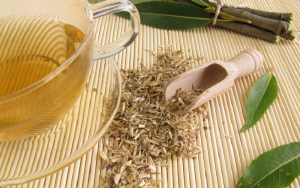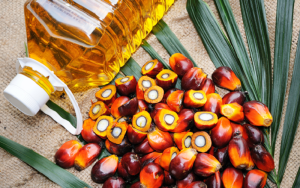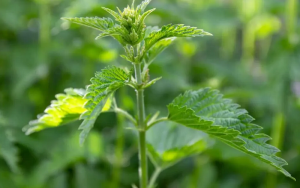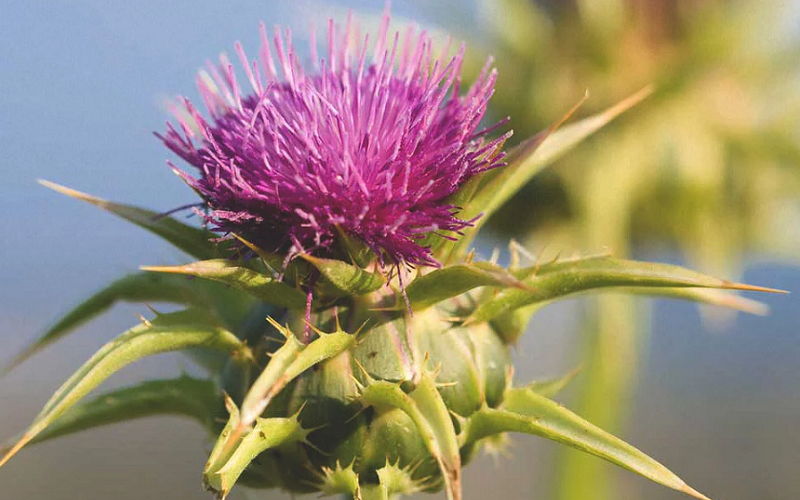
In a world increasingly filled with environmental pollutants, unhealthy diets, and stressful lifestyles, maintaining good health is a pressing concern. Amid the various organs that require attention, the liver stands out for its role in detoxification and nutrient metabolism. Given this significance, it is imperative to keep it in optimum health, and nature provides us with potent aids to achieve this. One such natural aid is Milk Thistle extract.
Contents
The Milk Thistle Plant: A Brief History and Description
As the world becomes increasingly mindful of the importance of natural health aids, Milk Thistle extract has gained substantial attention. Often seen as a mere weed by the unknowing eye, the Milk Thistle plant possesses a long history of medicinal use and is recognized for its potent benefits for liver health.
Origin and Distribution
The Milk Thistle plant, scientifically known as Silybum marianum, hails from the Mediterranean regions of Europe, Africa, and the Middle East. However, due to its resilience and adaptability, the plant has now spread worldwide, from North and South America to Australia and Asia. It favors dry, sunny climates and is often found growing wild in rocky soils and wastelands.
In terms of appearance, Milk Thistle is an annual or biennial plant that can grow up to 2 meters tall. It is easily recognizable by its glossy green, spiky leaves streaked with unique white veins, and striking purple to pink flowers. The plant’s name derives from the milky white sap that spills from the leaves when crushed.
Historical Uses in Medicine
Milk Thistle has been cherished for its medicinal properties since ancient times. The Greek physician and botanist, Dioscorides, was among the first to document the therapeutic potential of Milk Thistle in the 1st century AD. He described the plant as beneficial for ‘carrying off bile,’ a clear reference to its liver-supporting properties.
Throughout the Middle Ages, Milk Thistle was utilized for various ailments, including plague and snake bites, owing to its believed detoxifying qualities. However, its most consistent use across centuries has been associated with liver and gallbladder disorders.
Fast forward to the modern era, and Milk Thistle continues to enjoy a reputation as a potent natural remedy, particularly for liver health. This is primarily due to its active constituent, Silymarin, which has been the subject of extensive research for its hepatoprotective properties and potential role in liver detoxification.
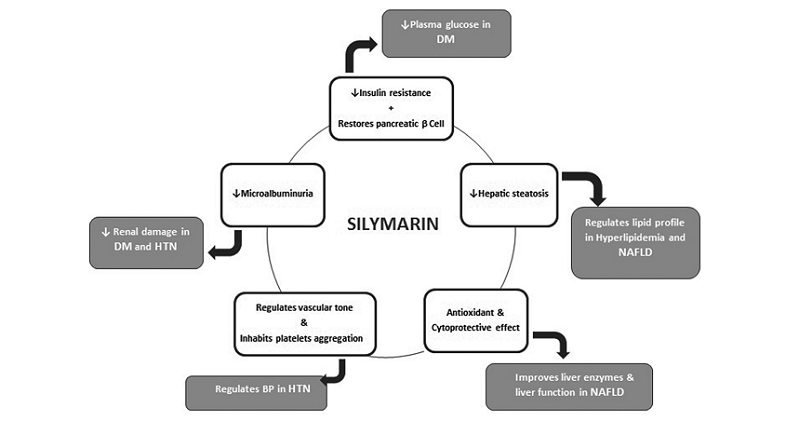
Understanding the Liver: Functions and Importance
Before getting further into how Milk Thistle benefits liver health, it is essential to understand what exactly the liver does and why it is so crucial to our wellbeing. The liver, one of the largest organs in our bodies, plays a central role in various metabolic processes and is instrumental in maintaining overall health.
Overview of Liver Functions
The liver is a true workhorse. Every day, it performs over 500 different functions that are vital for our survival. These tasks range from detoxification to digestion, and from energy storage to the synthesis of important proteins and hormones.
One of the liver’s primary roles is to filter the blood coming from the digestive tract before it travels to the rest of the body. During this process, the liver detoxifies harmful substances like alcohol and drugs, metabolizes the nutrients we consume into usable forms, and eliminates waste products via bile.
Moreover, the liver helps regulate our blood sugar levels by converting excess glucose into glycogen for storage and later use. It also plays a pivotal role in fat metabolism, breaking down fats and producing cholesterol and other essential lipids.
Impact of Unhealthy Liver on Overall Health
Given the critical roles the liver plays, it’s not hard to imagine how a compromised liver can significantly impact our health. Liver disorders can lead to a variety of health issues, ranging from fatigue and weight loss to jaundice, swelling in the legs and abdomen, and even mental confusion.
In more severe cases, chronic liver diseases like cirrhosis, liver failure, or liver cancer can occur. These conditions can have devastating effects and significantly lower a person’s quality of life.
In essence, maintaining a healthy liver is not just about avoiding liver disease; it’s a crucial aspect of preserving overall health and wellbeing. And this is where natural aids like Milk Thistle come into play, offering potential benefits for supporting liver function and facilitating detoxification [1].
Common Factors that Influence Liver Health
Just as with any other organ, various factors influence the health and function of the liver. Some of these are within our control, like lifestyle choices, while others, such as environmental pollutants and certain medical conditions, can be harder to manage.
Lifestyle Factors: Diet, Alcohol, and Smoking
Our daily habits significantly impact liver health. The liver processes everything we consume, making diet a critical factor. Overeating, particularly foods high in fats and sugars, can lead to obesity, which in turn can cause non-alcoholic fatty liver disease (NAFLD), a growing health concern worldwide. It’s therefore crucial to maintain a balanced diet rich in fruits, vegetables, whole grains, lean proteins, and healthy fats.
Alcohol is another major player. While moderate alcohol consumption may not cause severe damage, chronic and heavy drinking can lead to alcoholic liver disease, ranging from fatty liver and alcoholic hepatitis to cirrhosis.
Moreover, smoking is also detrimental to liver health. The harmful chemicals in tobacco smoke can cause oxidative stress, leading to inflammation and scarring of liver tissue, ultimately contributing to liver diseases [2].
Environmental Factors: Pollutants and Toxins
We live in an increasingly polluted environment, where we’re frequently exposed to toxins that can harm the liver. These include certain industrial chemicals, heavy metals, and even some natural toxins in food. Extended exposure to these substances can overburden the liver, impairing its ability to detoxify and leading to various liver diseases.
Medical Factors: Medications and Diseases
Certain medications, especially when taken in high doses or for extended periods, can negatively impact the liver. Over-the-counter drugs like acetaminophen, when used excessively, can cause liver damage. Similarly, long-term use of certain prescription drugs can lead to drug-induced liver injury.
Moreover, specific diseases can directly affect liver health. Viral infections like hepatitis B and C can cause chronic liver disease and circoma. Autoimmune liver diseases, genetic disorders like Wilson’s disease, and even other conditions like diabetes can also adversely impact liver function.

Milk Thistle and Its Active Component: Silymarin
The medicinal power of Milk Thistle lies primarily in its seeds, which contain a complex of compounds collectively known as Silymarin. This active component is the hero behind Milk Thistle’s health-promoting properties, particularly in relation to liver health.
Structure and Composition of Milk Thistle Extract
The extract of Milk Thistle, typically derived from its seeds, is a dense source of bioflavonoids, a group of antioxidant compounds that help the body fight off harmful free radicals. The most significant of these bioflavonoids is Silymarin, which makes up about 70-80% of the extract.
Silymarin itself is not a single compound but a mix of several flavonolignans, including Silibinin (also known as Silybin), Isosilybin, Silychristin, and Silydianin, each contributing to the extract’s overall health benefits [3].
Unpacking Silymarin: Properties and Mechanisms
Silymarin, the primary active compound in Milk Thistle extract, is renowned for its potent antioxidant, anti-inflammatory, and hepatoprotective properties.
As an antioxidant, Silymarin scavenges harmful free radicals and reduces oxidative stress, which is a major contributor to liver damage. By strengthening the outer membranes of liver cells, it also inhibits toxins from entering the cells.
Silymarin’s anti-inflammatory properties help in reducing inflammation in the liver, often a response to injury or infection, thereby preventing further damage.
Its hepatoprotective function comes from its ability to stimulate protein synthesis in liver cells, promoting their regeneration. It also inhibits the deposition of collagen fibers, a characteristic feature of liver fibrosis and cirrhosis.
In essence, Silymarin plays a key role in mitigating liver damage and promoting liver health. In the following sections, we will explore in detail how these properties of Silymarin translate into tangible health benefits, particularly concerning liver health and detoxification [4].
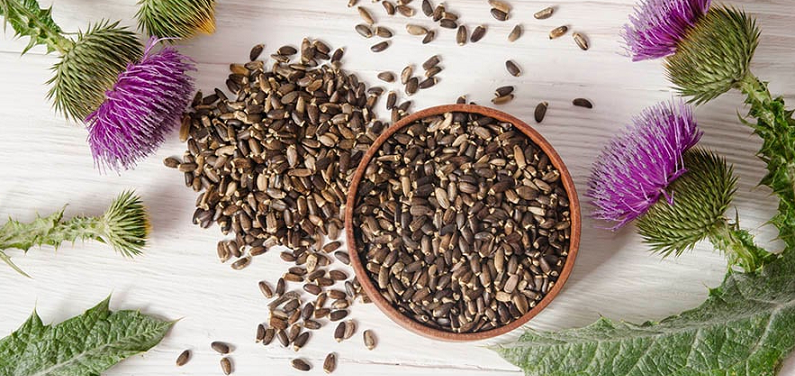
Evidence-Based Benefits of Milk Thistle for Liver Health
While the use of Milk Thistle for liver ailments has been documented in traditional medicine for centuries, it’s only recently that science has started to catch up. Modern research provides growing evidence supporting the use of Milk Thistle and its active component, Silymarin, in promoting liver health.
Milk Thistle and Liver Diseases
Several studies have demonstrated the potential of Milk Thistle extract in managing various liver diseases. In patients with alcohol-related liver disease, supplementation with Milk Thistle showed improvements in liver function tests. Similar results have been observed in cases of non-alcoholic fatty liver disease (NAFLD), where Milk Thistle was found to reduce liver inflammation and fat accumulation.
Silymarin’s ability to promote liver cell regeneration may also offer benefits in more severe conditions such as cirrhosis and hepatitis. Some research indicates that Milk Thistle may improve liver function and reduce disease progression in these cases. However, more rigorous clinical trials are needed to establish these benefits definitively [5].
Milk Thistle as a Liver Detoxifier
Milk Thistle is widely regarded as a natural detoxifier, helping cleanse the body of harmful substances. Its active compound, Silymarin, strengthens the outer membranes of liver cells, preventing toxins from entering and damaging the cells.
Additionally, Silymarin stimulates the production of glutathione, a potent antioxidant that the liver uses to neutralize toxins. This makes Milk Thistle a potential aid in liver detoxification, helping protect the liver from harmful substances and oxidative stress [6].
Milk Thistle and Drug-Induced Liver Injury
Drug-induced liver injury is a common problem, often resulting from the overuse of certain medications. The hepatoprotective properties of Milk Thistle have made it a subject of interest in preventing and managing this issue.
Several studies suggest that Milk Thistle, when used alongside the medication, may reduce liver toxicity and improve liver function. This is particularly notable in the case of drugs like acetaminophen, certain antibiotics, and chemotherapy agents.
References
[1] Milk thistle
[2] What are the benefits of milk thistle?
[3] Milk thistle Information | Mount Sinai – New York
[4] Detoxing Your Liver: Fact Versus Fiction
[5] Milk thistle | Complementary and Alternative therapies
[6] Milk Thistle: Effects on Liver Disease and Cirrhosis and Clinical Adverse Effects

